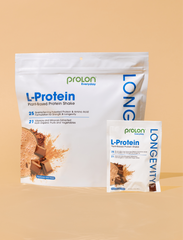
Is Love the Ultimate Longevity Hack?
The Power of Love, Community, and Social Connection in Supporting Healthy Aging.
Living well into your 100s isn’t just about eating the right foods, staying physically active, or getting enough sleep—though those things certainly help. Research consistently shows that some of the most crucial factors for a long and healthy life are love, community, and social connection. In fact, longevity sites, where people live the longest and healthiest lives, all share one key feature: close-knit communities. According to Time Magazine, these communities foster strong social ties, emotional support, and deep-rooted cultural connections, all of which contribute to the residents' remarkable longevity.
But what exactly happens within our bodies when we experience love and social bonding? And how can we foster these connections to not only live longer but to also age better too? Let’s explore the healthy aging benefits of social connection and community.
The Physiological Benefits of Love and Connection
When we think about the physical benefits of social connection, we often overlook how deeply our emotional relationships can affect our well-being. These relationships can reach far beyond our hearts to even impact our very biology.
-
Reduced Stress and Lowered Cortisol Levels: Positive relationships—whether romantic, familial, or friendly—may help lower levels of cortisol, the hormone produced during times of stress. High cortisol levels, sustained over long periods, have been shown to contribute to chronic illnesses. In contrast, socializing with loved ones often provides a soothing effect, helping the body maintain a state of balance and reducing the negative effects of stress.
-
Boosted Immunity via Oxytocin: When we spend time with people we care about, our bodies may release oxytocin, often referred to as the “love hormone.” This hormone has been shown to improve immune function while enhancing feelings of happiness and security. Higher oxytocin levels have been linked to stronger immune responses, making social connections a key pillar in feeling your best.
- Lower Risks of Heart Disease, Depression, and Cognitive Decline: Studies have shown that people with strong social networks may also have lower risks of heart disease and other chronic conditions. In addition, social connections may help to alleviate depression and prevent cognitive decline. Engaging with others on a regular basis—whether through deep conversations or shared activities—has been shown to stimulate the brain and foster emotional resilience.
The Harvard Study of Adult Development: Relationships Are Key to Happiness
One of the most extensive studies on happiness and health is the Harvard Study of Adult Development. Over the course of 80 years, this ongoing study has followed the lives of over 1300 men, examining factors like their physical health, work life, and relationships. The results are clear: the key to long-term happiness and health is not wealth, status, or even career success, but the quality of close relationships.
Dr. Robert Waldinger, the study's current director, has shared that the participants who reported the highest levels of satisfaction were those with strong family ties and close friendships. This research has been groundbreaking in underscoring the importance of social relationships for both emotional and physical well-being.
The Impact of Loneliness and Isolation on Aging
On the flip side, loneliness and social isolation may have negative effects on aging. Research has found that loneliness is as harmful to our health as smoking 15 cigarettes a day. As we age, the ability to form and maintain meaningful connections becomes even more critical. These relationships provide comfort and strength during times of adversity, making it easier to cope with life's inevitable ups and downs. They act as a buffer against stress, allowing us to maintain better mental health and, ultimately, live longer, more fulfilled lives.
How Strong Social Networks Inspire Healthier Choices
Having a strong social network has also been shown to encourage healthier lifestyle choices. People in supportive communities are more likely to engage in physical activities together, whether it’s walking, biking, or participating in sports.
Strong social networks also make it easier for healthier food choices. Whether it’s joining someone for a home-cooked meal or participating in a health-focused event, the encouragement from others can motivate us to stick to our wellness goals; the sense of belonging and shared purpose fosters a collective commitment to a healthier lifestyle.
In fact, research suggests that when people surround themselves with others who value healthy living, they are more likely to adopt those same habits. This is one reason why the communities in the longevity sites tend to have such high life expectancies—they reinforce behaviors like regular physical activity, plant-based diets, and stress reduction techniques, all through social networks that promote well-being.
Tips for Building and Maintaining Community
So how can we create and nurture these meaningful relationships in our own lives? Here are some tips:
-
Strengthen Bonds with Family and Friends: Make an intentional effort to nurture relationships with those closest to you. Schedule regular calls, dinners, or activities with loved ones. Small, consistent gestures go a long way in strengthening connections.
- Join or Create Communities: Whether it’s a local hiking group, a book club, or a health-focused social media group like Prolon’s Facebook community, joining or creating a community with shared values can provide the support you need.
- Engage in Shared Activities: Participate in activities that bring people together. This could be anything from volunteering to taking a cooking class or going on nature walks; generally look to engage with others in meaningful ways.
Cultivate Connection for a Longer, Happier Life
Love, community, and social connection are natural, low-cost, and highly effective ways to extend both the quantity and quality of our lives. These connections serve as foundational pillars for healthy aging, alongside key practices like good nutrition, exercise, and sleep.
As research continues to show, healthy aging is about the whole picture: a balanced diet, physical activity, quality sleep, and, most importantly, deep, meaningful connections with the people around us. These bonds can make all the difference in living a longer, healthier, and happier life.













